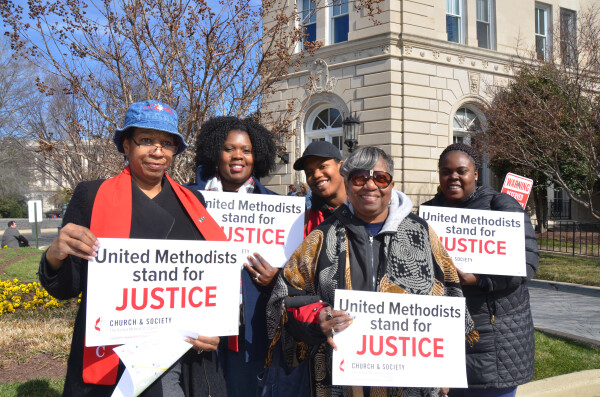United Methodist Women Affirm March for Our Lives
By Erik Alsgaard

If it involves youth, children, or women, odds are the United Methodist Women will be there or have something to say about it. That was evident March 24 when hundreds of thousands of people gathered at more than 800 events to protest current gun laws in the United States, and to call on Congress to change them.
United Methodist Women were there, putting their prayers into action.
The March for Our Lives in Washington, D.C., brought together celebrities and people from all walks of life to send a message to lawmakers: gun laws need to be changed so that people are safe. The rally was led by children and youth from Marjory Stoneman Douglas High School in Parkland, Fla., following a mass shooting there in February.
In a statement, United Methodist Women said it “recognizes and affirms the leadership of these prophetic young people” leading the March.
“More than seven American children and youth are killed by guns on an average day,” the statement continued. “The Book of Resolutions of The United Methodist Church (Resolution #3428, "Our Call to End Gun Violence") calls for congregations ‘to advocate at the local and national level for laws that prevent or reduce gun violence.’ Gun policy is fraught with a plethora of opinions within our country, church
“No single policy will fix the epidemic of gun violence, but we can do better than this. Banning the sale of military-style assault weapons and high-capacity magazines to the general public is a much-needed reform, supported by two of three American voters. While such a ban would not save the lives of most gun victims, who are killed by smaller handguns, it limits the possibility of large-scale attacks like those in Parkland, Newtown, Las Vegas
Willa Kynard, a member of McKendree-Simms-Brookland UMC in Washington, D.C., came to the March to protest against guns.
“We don’t need them in our country,” she said. “Especially anything that’s high-powered.”
An active member of the Baltimore-Washington Conference’s UMW, Kynard said that citizens not only have the
“Gun rights
Symphony Lewis, 14, is a ninth-grader who attends Gwynn Oaks UMC in Baltimore, Md. She’s been to Mission u, where she learned the importance of United Methodist Women, she said. She came to DC for the March to put a stop to gun violence.
“We don’t really need guns the United States,” she said, “unless it’s for war, and we’re don’t have war.”
At her school, the students did not hold a walk-out on March 14 – the one-month anniversary of the Parkland shooting – but, instead, sat in silence for 17 minutes, Lewis said. It felt good to do something, she said, for those students who needlessly died.
Sabrina White serves as the treasurer of the Baltimore-Washington Conference’s UMW. She stood with Kynard, Lewis, and others to lend her voice to the cause.
“When we have our youth being killed in schools, there’s got to be
She encouraged other United Methodist Women to “say something” about gun violence.
“Vote is the number one thing,” she said. “As United Methodist Women, we vote. We’re a group of over 800,000 women, and we do want to protect our youth.”
Kunda Musonda, co-president of the Greater Washington District UMW in the Baltimore-Washington Conference, said that, as a mother, “I’ve had enough. When my children go to school, it’s concerning because I don’t know what’s going to happen.”
A member of Emory UMC in Washington, D.C., she said that it’s time to consider changing some of the laws so that children can be safer.
“I think that the simple fact that the children are leading this makes a big difference,” she said. “It’s not an adult initiative.”
Shanae Als was invited by the United Methodist Women of the Baltimore-Washington Conference to attend the March.
“At the end of the day, our young people are the heart of what UMW stands for,” said Als. “And supporting them means that we have a future legacy that’s going to stand another 150 years.” United Methodist Women are celebrating their 150th anniversary in 2018. They began on March 23, 1869, when eight women gathered at Tremont Methodist Episcopal Church in Boston, Massachusetts, and organized the Women's Foreign Missionary Society.
“That’s what UMW
